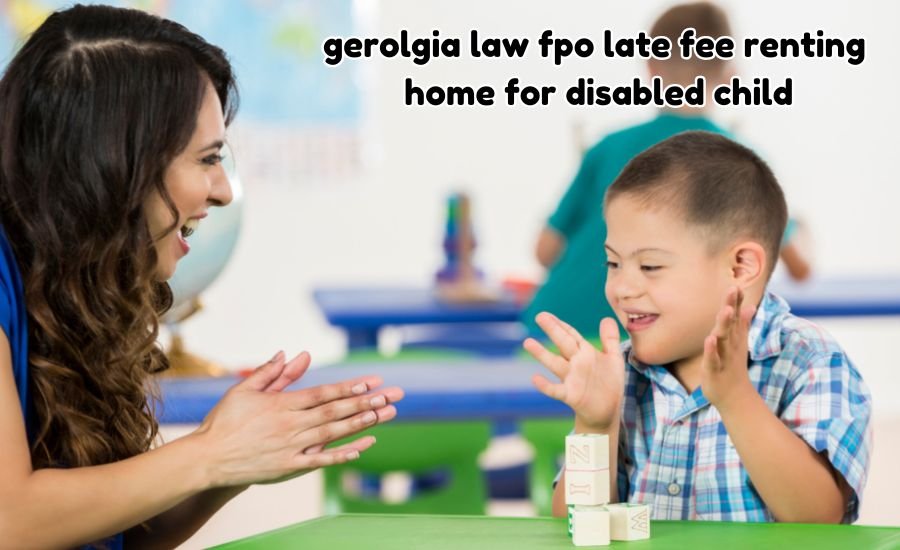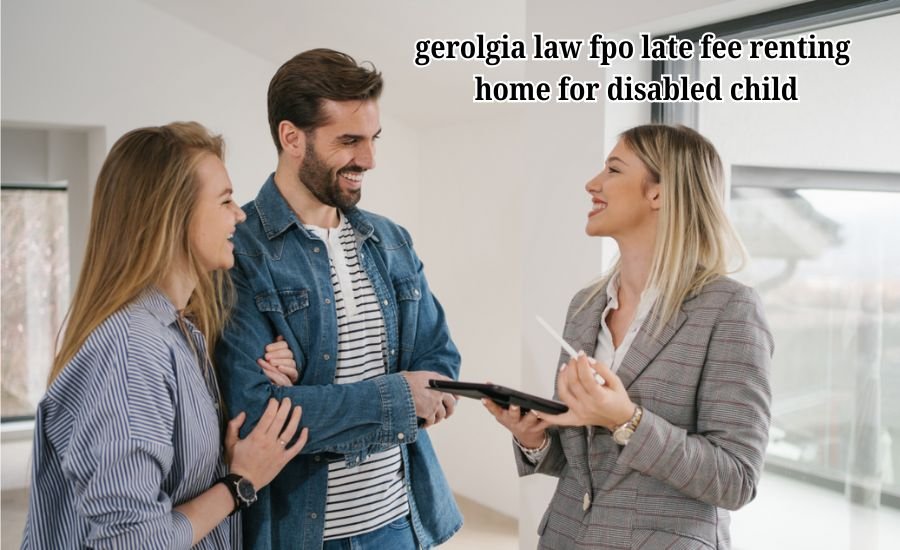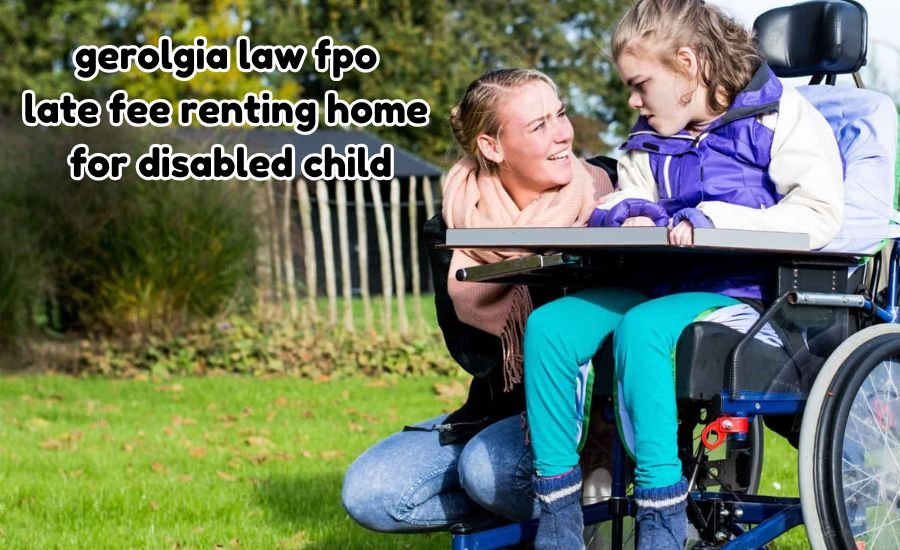Gerolgia law fpo late fee renting home for disabled childis important for families looking for housing. If you have a disabled child, you need to know how these laws work. Late fees can add extra costs, so it’s good to understand what you might face when renting a home.
When you rent a home in Georgia, there are rules about late fees. These rules help protect families, especially those with disabled children. Knowing these laws can help you avoid extra fees and find a better home for your child. Let’s explore more about these laws and what they mean for you.
What is Georgia Law FPO on Late Fees?
Gerolgia law fpo late fee renting home for disabled child helps families understand their rights. When renting a home, landlords can charge late fees if you do not pay your rent on time. However, there are limits to how much they can charge undergerolgia law fpo late fee renting home for disabled child. It is important for families to know these limits so they are not surprised by high fees. This law makes sure that late fees are fair and reasonable, especially for families facing challenges.
Families with disabled children often have unique challenges when it comes to renting. Understanding gerolgia law fpo late fee renting home for disabled child helps protect these families from high fees. Many families worry about extra costs, especially if they are already facing medical expenses. Knowing what to expect can make renting easier for everyone involved, allowing families to focus on their child’s needs without the added stress of unfair charges.
In Georgia, landlords must follow specific rules about late fees. For example, they must inform tenants about these fees in writing. This gives families a clear idea of what could happen if rent is late, and this clarity is part of gerolgia law fpo late fee renting home for disabled child. By understanding these laws, families can avoid surprises and plan their budgets better. This knowledge is vital for managing finances effectively and ensuring a smooth renting experience.
Understanding Late Fees in Renting
Late fees can be confusing for many renters, especially those with special needs. Gerolgia law fpo late fee renting home for disabled child aims to clear up this confusion. A late fee is a charge that landlords can add if rent is not paid on time. But there are rules that limit how much they can charge according to Gerolgia law fpo late fee renting home for disabled child. For example, a landlord cannot charge more than a certain amount, usually around 5% of the rent, ensuring that fees remain manageable.
Many families may wonder how late fees work in practice. If a family has a lease agreement, it should explain all the details about late fees under gerolgia law fpo late fee renting home for disabled child. Understanding this information helps families avoid unexpected costs. If rent is late, they will know exactly what to expect. Being informed can help families make better financial decisions and help them feel secure in their housing situation.
Also, landlords must give a grace period before charging late fees. This means tenants have a little extra time to pay rent without penalties. Knowing about this grace period is very important for families, especially those with disabled children, as outlined in gerolgia law fpo late fee renting home for disabled child. It allows them to manage their finances better and avoid extra stress while ensuring they can meet their obligations.
How Georgia Law Helps Families with Disabled Children

Gerolgia law fpo late fee renting home for disabled child provides extra protections for families with disabled children. Families often face more challenges when renting, and this law helps ensure they are treated fairly. Understanding these protections can help families feel more secure in their housing choices, knowing they have rights under gerolgia law fpo late fee renting home for disabled child.
For instance, if a family is facing financial difficulties, they can ask their landlord for more time to pay rent. Georgia law encourages landlords to be understanding and work with tenants under gerolgia law fpo late fee renting home for disabled child. This is important for families who may have unexpected expenses due to medical needs. Open communication can help families avoid late fees altogether and create a more supportive rental environment.
Furthermore, if a landlord tries to charge unfair late fees, families can seek help. There are organizations and legal resources available in Georgia that support families, specifically in relation to gerolgia law fpo late fee renting home for disabled child. Knowing these resources is essential for families to protect their rights. They can ensure they do not pay unnecessary fees while renting a home, creating a stable living situation for their children.
The Importance of Knowing Your Rights
Knowing your rights as a renter is crucial for everyone, especially those with unique challenges. gerolgia law fpo late fee renting home for disabled child helps families understand these rights. When families are informed, they can make better decisions, knowing they are protected under gerolgia law fpo late fee renting home for disabled child. This knowledge can lead to happier and more secure living situations for families.
Being aware of your rights means knowing how to respond to issues. For example, if a landlord charges a late fee that seems too high, families can ask questions based on gerolgia law fpo late fee renting home for disabled childb. They should check the lease agreement and seek clarification on the fees. This empowers families to stand up for themselves and protect their finances from unfair charges.
Moreover, educating families about their rights can lead to better communication with landlords. Families can explain their situation and seek understanding. Landlords may be more willing to work with them, especially when they see that families know their rights under gerolgia law fpo late fee renting home for disabled child. This can lead to better relationships and a more positive renting experience for everyone involved.
What to Do if You Face a Late Fee
If you face a late fee, it is important to know what steps to take to address the situation. First, families should read their lease agreement, as it outlines terms in accordance with gerolgia law fpo late fee renting home for disabled child. This law provides guidelines that can help families understand if the fee is fair and reasonable. If the fee seems too high, they can ask their landlord for an explanation based on gerolgia law fpo late fee renting home for disabled child.
Next, communication is key when addressing late fees. Families should talk to their landlord as soon as possible if they are facing a late fee. Explaining their situation may lead to a resolution under gerolgia law fpo late fee renting home for disabled child. Sometimes, landlords are willing to negotiate and waive the fee if they understand the family’s circumstances. Being polite and honest can help build a better relationship and may lead to a more favorable outcome.
If the issue cannot be resolved through direct communication, families can seek help. There are local organizations that provide support and advice for renters under gerolgia law fpo late fee renting home for disabled child. They can guide families through the process and help them understand their rights. Seeking assistance is a smart step to take when dealing with late fees to ensure that families do not bear unfair financial burdens.
Georgia Law FPO: Protecting Your Family

Gerolgia law fpo late fee renting home for disabled child is designed to protect families from unfair practices. These laws ensure that renting is fair and accessible for all families, particularly those with disabled children. Families can feel more confident when they know their rights and the protections available to them under gerolgia law fpo late fee renting home for disabled child. This security is especially important for families navigating the rental market.
The law provides guidelines for how much landlords can charge as late fees. It also encourages fair treatment of all tenants under gerolgia law fpo late fee renting home for disabled child. Knowing these laws can help families avoid financial stress related to high late fees. They can feel supported and empowered in their housing decisions, creating a better environment for their disabled children.
Additionally, this law encourages landlords to be understanding. When families explain their situations and refer to their rights under gerolgia law fpo late fee renting home for disabled child, landlords may be more willing to help. This can lead to positive outcomes for everyone involved, allowing families to find a safe and comfortable home without the worry of unfair fees.
Finding a Home for Your Disabled Child
Finding a home for your disabled child can be challenging, and understanding gerolgia law fpo late fee renting home for disabled child can ease some of these challenges. It is important for families to look for homes that meet their child’s needs. Accessibility features are key, and knowing your rights can help you find the right place while being aware of potential late fees under gerolgia law fpo late fee renting home for disabled child.
When searching for a home, families should consider what they need. This might include wheelchair access or close proximity to schools and medical facilities. Understanding gerolgia law fpo late fee renting home for disabled child can also help families navigate rental agreements and ensure they are treated fairly. They can ensure that the homes they are considering are both accessible and within legal guidelines regarding fees.
Working with a real estate agent who understands the needs of families with disabled children can also be beneficial. These professionals can help families find the best options in their area while providing knowledge about gerolgia law fpo late fee renting home for disabled child. Knowing about the protections under this law can make the process smoother and less stressful for families looking for suitable housing.
How to Avoid Late Fees When Renting
Avoiding late fees is important for families renting a home. Gerolgia law fpo late fee renting home for disabled child provides helpful tips for families to manage their finances effectively. One of the best ways to avoid late fees is to pay rent on time. Setting reminders on a calendar or phone can help keep track of payment due dates. This proactive approach can reduce the likelihood of facing penalties under gerolgia law fpo late fee renting home for disabled child.
Another tip is to communicate with the landlord. If a family knows they might be late, they should inform their landlord ahead of time. This communication can sometimes lead to a grace period or understanding regarding late payments, as outlined in gerolgia law fpo late fee renting home for disabled child. Good communication can help maintain a positive relationship and reduce stress for families.
Lastly, families should budget wisely to avoid late fees. By planning their finances, they can ensure they have enough money set aside for rent each month. This strategy can help avoid late payments and keep families from worrying about extra fees. Knowing their rights under gerolgia law fpo late fee renting home for disabled child also empowers families to advocate for fair treatment in their rental agreements.
Resources for Families in Georgia
There are many resources available for families in Georgia regarding renting. Gerolgia law fpo late fee renting home for disabled child is essential for families to understand. Local organizations can provide guidance and support to families navigating the rental market. These resources can help families learn about their rights and the laws that protect them when renting a home.
Families can access information from legal aid organizations. These groups often offer free advice and assistance regarding tenant rights under gerolgia law fpo late fee renting home for disabled child. They can help families understand their rights and responsibilities, making the renting process less overwhelming. This support is invaluable, especially for families with disabled children facing unique challenges.
Additionally, community workshops are often available. These events educate families on tenant rights and late fee regulations. Attending these workshops can empower families to understand gerolgia law fpo late fee renting home for disabled child. By engaging with these resources, families can feel more confident in their renting journey and make informed decisions that benefit their children.
Building a Positive Relationship with Landlords

Building a good relationship with landlords is essential for families renting a home. Gerolgia law fpo late fee renting home for disabled child emphasizes the importance of communication and respect. Families should always be honest about their needs and concerns. This open dialogue can lead to better understanding and support from landlords, especially when it comes to special requests for disabled children.
Regular communication can help families avoid misunderstandings regarding late fees and other rental agreements. Families should discuss their rights under gerolgia law fpo late fee renting home for disabled child. When landlords see that families are informed and proactive, they may be more willing to accommodate requests. This positive relationship can create a supportive renting environment that benefits everyone.
Additionally, being respectful and understanding toward landlords can go a long way. Families should remember that landlords also have responsibilities and concerns. Showing appreciation for their efforts can foster goodwill and encourage landlords to be flexible regarding late fees under gerolgia law fpo late fee renting home for disabled child. Building these relationships can make the renting experience smoother and more enjoyable for all.
Conclusion
Understanding gerolgia law fpo late fee renting home for disabled child is vital for families. This law protects their rights and helps ensure fair treatment. Families can navigate the renting process confidently when they know their rights. They can avoid unnecessary fees and focus on finding the best home for their disabled child.
Empowerment comes from knowledge. By learning about their rights, families can communicate effectively with landlords. They can advocate for themselves and make informed decisions about their living situation. This knowledge is crucial for creating a safe and comfortable home environment.
In the end, families deserve to feel secure and supported in their renting journey. Understanding gerolgia law fpo late fee renting home for disabled child is the first step. With this knowledge, families can make the best choices for their needs and create a brighter future for their children.
Read More: Arrests-org-dennis-durden
FAQs
Q: What is the Georgia law regarding late fees for renting homes?
A: Georgia law regulates late fees that landlords can charge tenants. It ensures that late fees are reasonable and not excessively high, typically capping them at around 5% of the rent.
Q: Can landlords charge late fees immediately after rent is due?
A: No, landlords must provide a grace period before charging late fees. This period allows tenants a little extra time to pay rent without incurring additional charges.
Q: How does Georgia law protect families with disabled children regarding late fees?
A: Georgia law encourages landlords to be understanding and flexible with families of disabled children, allowing for discussions about payment delays and possible waiving of late fees in certain circumstances.
Q: What should I do if I believe a late fee is unfair?
A: If you feel a late fee is excessive or unjust, review your lease agreement and discuss it with your landlord. If necessary, seek assistance from local tenant advocacy groups or legal aid organizations.
Q: Are there resources available for families navigating rental challenges?
A: Yes, various organizations offer support and information for families dealing with rental issues, including legal aid services that can help families understand their rights under Georgia law.
Q: How can I avoid late fees when renting a home?
A: To avoid late fees, pay your rent on time, set reminders for payment due dates, and communicate with your landlord if you anticipate any delays.
Q: What information should be included in a rental agreement regarding late fees?
A: A rental agreement should clearly outline the late fee amount, the grace period, and the conditions under which late fees may be applied, ensuring transparency for all parties involved.



